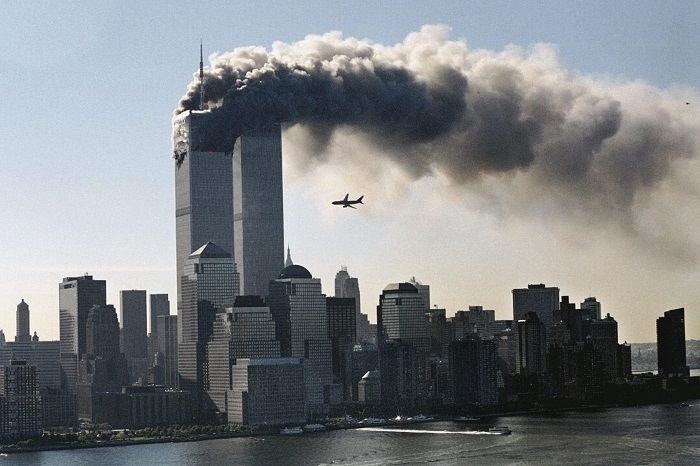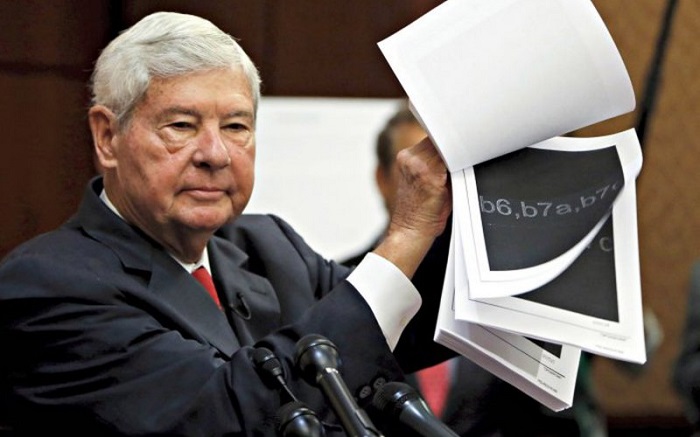Close watchers of the possible Saudi-9/11 connection will find few surprises. And the pages will settle no controversies.
But they did provide all sorts of tantalizing and inconclusive hints at links between the infamous al Qaeda terrorists and their supporters in the Saudi government--the very government that the terrorist group had vowed to destroy. For instance, there’s the discovery of a CIA memorandum that discussed “alleged financial connections between the September 11 hijackers, Saudi Government officials, and members of the Saudi Royal Family…”
The memo was drafted by a CIA officer, whose name is blacked out, “relying primarily on information from FBI files.” The officer sent the memo to the CIA’s Counterterrorism Center and provided a copy to an FBI agent. But the memo was apparently never sent to FBI headquarters.
That’s one of few new revelations. Much of the contents of perhaps the most famous classified documents in U.S. history were already known, thanks to a steady drip of leaks by those who had read them and the advocacy of Sen. Bob Graham, who chaired the inquiry and has been pressing for the pages’ release for years. (News accounts have always stated that there were 28 pages in total, but it turns out there are 29.)
Graham had said the Bush and Obama administrations had for years been withholding vital information about the attacks from the American public. U.S. officials had given no explicit reason why the pages should be withheld, and appeared to do so only recently because of renewed press interest in the pages’ findings.
But scanning through the 29 pages, one is immediately struck by the abundance of words like “speculate” and “allegations” and “may have provided support.” Had the pages been released in their entirety, the congressional inquiry might very well have been accused of inciting a mob, publishing unproven and in some cases un-investigated allegations about specific individuals and their connection to the mass murder of 3,000 people.
The joint inquiry itself acknowledged in the 29 pages that it had not investigated the leads it wanted to publish, which came largely information collected by the FBI early in the 9/11 investigation. "It was not the task of this Joint Inquiry to conduct the kind of extensive investigations that would be required to determined the true significance of any such alleged connections to the Saudi Government,” the pages state, noting that some of the suspected links could turn out to be completely innocent.
The inquiry’s intention was to provide a roadmap for future investigations and inquiry, not to close the case on 9/11.
The White House press spokesperson Josh Earnest said shortly before the pages were released to the public that they showed no evidence of Saudi complicity in the 9/11 attacks.
The Saudi ambassador to the U.S. said that his government had been calling for years to release the material, and that he hoped it would bring an end to speculation about Saudi involvement.
“We hope the release of these pages will clear up, once and for all, any lingering questions or suspicions about Saudi Arabia’s actions, intentions, or long-term friendship with the United States,” said Abdullah Al-Saud.
Rep. Adam Schiff, the top Democrat on the House Intelligence Committee, praised the Obama administration for publishing the documents with redactions that he said were necessary to protect intelligence sources and methods.
“I hope that the release of these pages...will diminish speculation that they contain proof of official Saudi Government or senior Saudi official involvement in the 9/11 attacks,” Schiff said in a statement.
That may be wishful thinking. Given that there’s not much news in the pages themselves, those who have long seen a substantial Saudi connections to the attacks are unlikely to be convinced otherwise now.
The 29 pages’ key finding had been known for some time.

“While in the United States, some of the September 11 hijackers were in contact with, and received support or assistance from, individuals who may be connected to the Saudi government.” There was also information, primarily from FBI sources, that “at least two of those individuals were alleged by some to be Saudi intelligence officers.”
One of those men, Omar al-Bayoumi, is identified in the report as a possible Saudi intelligence officer about whom the FBI “has received numerous reports” from people in the “Muslim community” going back to 1999. Al-Bayoumi’s name had already surfaced in press accounts as having provided “substantial assistance,” as the inquiry put it, to two hijackers after they arrived in San Diego in 2000. He’s described as having “extensive contact with Saudi government establishments in the United States.”
But U.S. and Saudi officials have subsequently said there was no evidence to connect Bayoumi to the hijackers. He did befriend them, but, he claims, only after a chance meeting in a restaurant in Feb. 2000 when he overheard them speaking Gulf Arabic. The FBI subsequently found no evidence that Bayoumi was an intelligence agent for Saudi Arabia.
The inquiry also raises questions about four other men who might have had ties to the hijackers. But it offered no clear evidence about the nature of their relationships.
There are some apparently new findings.
Bayoumi’s connections were already known. What’s new in the 29 pages is that a senior al Qaeda operative known as Abu Zubaydah, who was captured in Pakistan in March 2002 and then tortured in U.S. custody, had a phone book containing numbers connected to at least two Saudi individuals in the United States, according to what the inquiry describes as “FBI documents.”
One of those numbers was subscribed to by an Aspen, Co., company called ASPCOL Corporation, which “manages the affairs of the Colorado residence of the Saudi Ambassador” to the United States. But the CIA found “no direct links” between the numbers in Zubaydah’s phone book and numbers in the United States, the inquiry found.
Abu Zubaydah also had the phone number of a bodyguard at the Saudi embassy in Washington, DC, the inquiry found. The individual, whose name is blacked out, was put under investigation by the FBI “due to the size and value of his residence and his suspicious activity in approaching U.S.
Intelligence Community personnel.” The report also indicates that the bodyguard had a connection to the address of Bandar bin Sultan, then the Saudi ambassador to the United States. But there’s no indication from the report that the FBI found any direct links between hijackers and this or other numbers in the United States.
These were among some of the early findings of the FBI’s investigation, and according to the joint inquiry, the bureau’s understanding of the potential Saudi links was limited.
The FBI and the CIA “have only a limited understanding of the Saudi government’s ties to terrorist elements,” the inquiry found, and in testimony could not “identify definitively the extent of Saudi support for terrorist activity globally or within the United States…”
Part of the reason for that is law enforcement officials saw Saudi Arabia as an “‘ally,’” the pages saying, putting the word in quotation marks as if to question that assumption. Later, the report cites interviews with FBI agents and CIA officers who “complained to the Joint Inquiry about a lack of Saudi cooperation in terrorism investigations both before and after the September 11 attacks. For example, a veteran New York FBI agents stated that, from his point of view, the Saudis have been useless and obstructionist for years. In this agent’s opinion, the Saudis will only act when it’s in their self-interest.”
The 29 pages were redacted by Bush administration officials, and the Bush family had long-standing personal ties to the Saudi Royal Family. Saudi Arabia also was, and is, an important ally of the United States, however complicated the two countries’ relationship has been. It’s perhaps no surprise, then, that anonymous accusations of Saudi obstructionism from U.S. government personnel, with no clear evidence to support the claims, would be excised by administration officials from the final report.
Ties with Saudi Arabia were so important to Bush, in fact, that on his way out office he counseled president-elect Barack Obama on “the importance of maintaining a good relationship with Saudi Arabia,” according to presidential historian Martha Joynt Kumar’s book about the 2008 presidential transition, Before the Oath. So vital was the U.S.-Saudi alliance that Bush counseled Obama on it in the same meeting where he also encouraged the new commander-in-chief to continue two covert intelligence operations begun under Bush’s watch: drone strikes on terrorist groups overseas and cyber attacks on Iran’s nuclear facilities, Kumar writes.
U.S. and Saudi officials have long said that the suspicions raised by the inquiry were ultimately found to have no merit by the 9/11 Commission, which published a report in 2004 that’s widely seen as the definitive account of the attacks. The commissioners investigated the possible connections found in the 29 pages and couldn’t substantiate them, officials have said.
“People shouldn`t take them [the 29 pages] as evidence of Saudi complicity in the attacks,” CIA Director John Brennan, the former station chief in the capital of Riyadh, said in an interview last month with Arabiya TV.
"The 9/11 commission looked very thoroughly at these allegations of Saudi involvement,” Brennan said, adding, “their conclusion was that there was no evidence to indicate that the Saudi government as an institution or senior Saudi officials individually had supported the 9/11 attacks.” And that’s a conclusion backed up by the FBI and the CIA in their own investigations, U.S. and Saudi officials have said.
But it’s in those carefully hedged words—“the Saudi government as an institution” and “Saudi officials individually”—that writers, politicians, and amateur historians for years to come will find ample room to speculate about whether lower-level officials might have helped the hijackers get settled and plan their horrific assault.
Some members of the 9/11 Commission have rejected the characterization of their work as having let the Saudis off the hook.
“Evidence relating to the plausible involvement of possible Saudi government agents in the September 11th attacks has never been fully pursued,” commission member Sen. Bob Kerrey said in an affidavit to a lawsuit brought by family members of some 9/11 victims against the Saudi government.
And last May, commissioner John Lehman, a former secretary of the Navy, told CNN that the possible Saudi connections weren’t fully investigated and should now be "vigorously pursued." Lehman said that the commission found no evidence that the Saudi government as an institution was involved in the attacks, but he said commissioners purposely left open the possibility of involvement by individuals, including junior officials.
And the controversy over secret 9/11 documents won’t subside, thanks to a lawsuit in Florida, where a journalist is trying to force the release of more than 80,000 pages of FBI files about a family in Sarasota, and its possible connections to some of hijackers, including their leader Mohamed Atta.
A judge is going through those pages, one by one, to decide what can be released. There’s no deadline, and it’s anyone guess when he’ll finish.
















































